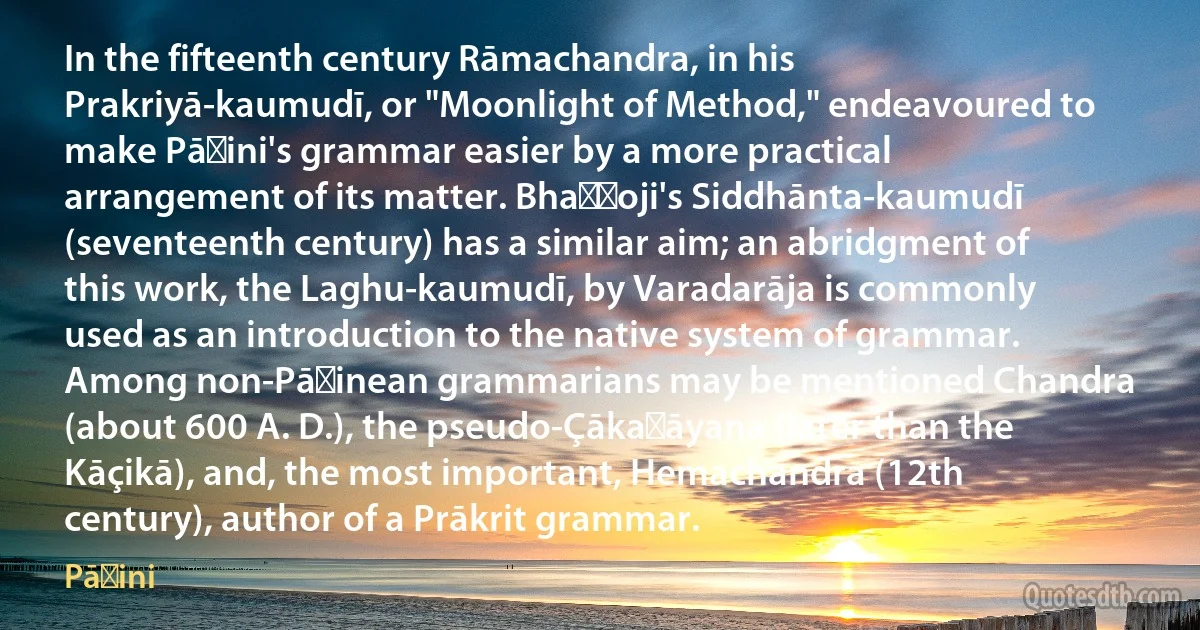
In the fifteenth century Rāmachandra, in his Prakriyā-kaumudī, or "Moonlight of Method," endeavoured to make Pāṇini's grammar easier by a more practical arrangement of its matter. Bhaṭṭoji's Siddhānta-kaumudī (seventeenth century) has a similar aim; an abridgment of this work, the Laghu-kaumudī, by Varadarāja is commonly used as an introduction to the native system of grammar. Among non-Pāṇinean grammarians may be mentioned Chandra (about 600 A. D.), the pseudo-Çākaṭāyana (later than the Kāçikā), and, the most important, Hemachandra (12th century), author of a Prākrit grammar.
PāṇiniRelated topics
aim arrangement century easy fifteenth grammar later matter seventeenth workRelated quotes
The really important facts were that spatial relationships had ceased to matter very much and that my mind was perceiving the world in terms of other than spatial categories. At ordinary times the eye concerns itself with such problems as where? - how far? - how situated in relation to what? In the mescaline experience the implied questions to which the eye responds are of another order. Place and distance cease to be of much interest. The mind does its perceiving in terms of intensity of existence, profundity of significance, relationships within a pattern.

Aldous Huxley
His [Turgot's] first important literary and scholastic effort was a treatise On the Existence of God. Few fragments of it remain, but we are helped to understand him when we learn that he asserted, and to the end of his life maintained, his belief in an Almighty Creator and Upholder of the Universe. It did, indeed, at a later period suit the purposes of his enemies, exasperated by his tolerant spirit and his reforming plans, to proclaim him an atheist; but that sort of charge has been the commonest of missiles against troublesome thinkers in all times.

Andrew Dickson White
I have always taken as the standard of the mode of teaching and writing, not the abstract, particular, professional philosopher, but universal man, that I have regarded man as the criterion of truth, and not this or that founder of a system, and have from the first placed the highest excellence of the philosopher in this, that he abstains, both as a man and as an author, from the ostentation of philosophy, i.e., that he is a philosopher only in reality, not formally, that he is a quiet philosopher, not a loud and still less a brawling one.

Ludwig Andreas Feuerbach
The method of successive approximations is often applied to proving existence of solutions to various classes of functional equations; moreover, the proof of convergence of these approximations leans on the fact that the equation under study may be majorised by another equation of a simple kind. Similar proofs may be encountered in the theory of infinitely many simultaneous linear equations and in the theory of integral and differential equations. Consideration of semiordered spaces and operations between them enables us to easily develop a complete theory of such functional equations in abstract form.

Leonid Kantorovich
My greatest concern was what to call it. I thought of calling it 'information,' but the word was overly used, so I decided to call it 'uncertainty.' When I discussed it with John von Neumann, he had a better idea. Von Neumann told me, 'You should call it entropy, for two reasons. In the first place your uncertainty function has been used in statistical mechanics under that name, so it already has a name. In the second place, and more important, no one really knows what entropy really is, so in a debate you will always have the advantage.'

Claude Elwood Shannon
